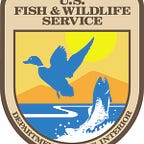Shelter from the Storm: The Port Authority of Guam Restores Harbor of Refuge with Boating Infrastructure Grants
By Lev Levy, public affairs officer, Pacific Region of the U.S. Fish and Wildlife Service
On May 24, 2023, Typhoon Mawar struck Guam.
The storm hit the island with 140 mph winds knocking out power and flooding buildings. A rain gauge in Dededo measured 28.42 inches of rain, most of which fell within three hours. Although Typhoon Mawar was the strongest storm to hit the island in 20 years, boats tied to moorings in Guam’s Harbor of Refuge were safe and sheltered from the storm.
Just one month earlier, the Port Authority of Guam completed a multi-year renovation project to repair the harbor. In partnership with the Guam Department of Agriculture’s Division of Aquatic and Wildlife Resources, and with the help of Boating Infrastructure Grant funding from the U.S. Fish and Wildlife Service, the port fixed the moorings just in time for the typhoon.
“The whole intention of the Harbor of Refuge is for boats to be able to seek shelter during a storm,” Dora Perez, a planner with the Port Authority of Guam said. “It’s a multi-use facility, and the primary use of the refuge is for safety of boaters during a storm.”
Perez started working for the Port Authority of Guam in 1989 as a clerk. Born and raised in Guam, she ascended the agency’s ranks until she became a planner in the port’s strategic planning division. Perez derives the most satisfaction from seeing how her projects benefit the community.
“Our projects are tangible,” Perez said. “When you walk on the docks, you just feel so good because it’s for the community.”
The harbor has 48 moorings that are open to a variety of boat types and sizes. Partnership funds from the Boating Infrastructure Grant program support tie-ups for recreational transient vessels more than 26 feet in length. While the primary use of the Harbor of Refuge is to provide a place where boats can shelter from the storms that frequently strike Guam during typhoon season, it’s also available for short-term boat parking.
Having a safe and functional harbor also provides conservation benefits. Tying up to a mooring instead of dropping an anchor protects fragile corals, reduces impacts on marine plants and animals, and curtails pollution.
“By ensuring that the boats are safely anchored, it helps maintain the health and biodiversity of the marine ecosystem,” Perez said. “A well-maintained moorage area reduces the impact of human activity on marine life and habitats.”
The project’s success was attributable to the Office of the Governor’s Marine Conservation Plan and the Guam Department of Agriculture’s Division of Aquatic and Wildlife Resources.
“Our agency’s partnership with the Port Authority of Guam has been invaluable with completing infrastructure projects to benefit the boating community,” Jay Gutierrez, Guam Department of Agriculture’s Division of Aquatic and Wildlife Resources Chief, said. “Having a safe area to moor will ensure that boats and the environment are protected, especially during storms.”
The Boating Infrastructure Grant program was established in 1998 and is administrated by the Service’s Office of Conservation Investment. The program provides funding to states to improve access to the historic, cultural, recreational, scenic, and natural resources within the U.S. for large boats. The grants have supported projects designed to strengthen local community ties to boaters and marine manufacturers, raise awareness about the economic benefits of recreational boating, promote partnerships, provide continuity of access to coastal communities, and provide areas of safe harbor. Funds from this program have expanded opportunities for boating and water-related recreation and the communities these activities support.
“The partnership between Guam’s Department of Agriculture and the Port Authority of Guam is a very effective collaboration,” Ruth Utzurrum, Service wildlife biologist and grants manager said. “They’ve done a great job with building infrastructure that provides boaters and the community with safe places to tie up, and access to recreational opportunities that also benefit conservation. The Harbor of Refuge renovation is the result of a very highly complementary, effective, and mutually beneficial partnership.”
The next phase of renovation includes adding a convenience dock and gangway. For now, the harbor is open — for the community, and beyond.
